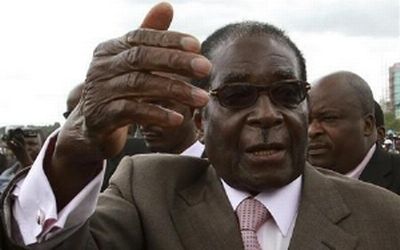
A meeting of the Global Political Agreement principals ended in a deadlock yesterday after the leaders disagreed on poll dates and the legalities surrounding Justice minister Patrick Chinamasa’s Tuesday court application to have elections deferred to August 14.
REPORT BY SENIOR REPORTER
Yesterday’s meeting was attended by President Robert Mugabe, MDC-T leader Prime Minister Morgan Tsvangirai, MDC president Welshman Ncube and Deputy Prime Minister Arthur Mutambara.
Ncube who is also Industry minister, attended the meeting as a principal for the first time.
The principals’ meeting followed last weekend’s Sadc extraordinary summit on the Zimbabwe crisis that directed Chinamasa to seek an extension from the Constitutional Court (Concourt) order after the court ordered Mugabe to proclaim elections by July 31.
Ncube confirmed the meeting in Harare was inconclusive, saying the principals will reconvene tomorrow to map the way forward for the country.
“The meeting adjourned until Friday (tomorrow),” he said. “Whether or not we will file another application will be concluded on Friday (tomorrow).
“Today’s meeting was inconclusive because (Mugabe) had to rush to a politburo meeting this (yesterday) afternoon.”
- Chamisa under fire over US$120K donation
- Mavhunga puts DeMbare into Chibuku quarterfinals
- Pension funds bet on Cabora Bassa oilfields
- Councils defy govt fire tender directive
Keep Reading
It also emerged that Cabinet had on Tuesday made a decision that the principals would meet together with two legal representatives to find a solution to the country’s legal crisis.
Ncube said today Zanu PF had a central committee meeting and so the earliest date they could schedule the meeting for was tomorrow.
“We will also meet as lawyers to see whether or not we can meet with a common position on Friday,” he explained.
Tsvangirai’s spokesperson Luke Tamborinyoka said the principals’ meeting had tasked Ncube, Chinamasa and MDC-T secretary-general, Tendai Biti to craft a new application to the Concourt as Chinamasa’s application was “unilateral”.
“The principals agreed that Welshman Ncube, Tendai Biti and Patrick Chinamasa should sit down and craft a court application, which represents the government in its inclusive nature,” he said.
“Chinamasa’s document which he filed yesterday (Tuesday) was not inclusive, so they have been tasked to craft a document that is inclusive.”
However, in another turn of events, Chinamasa yesterday made an urgent application to the Concourt seeking to have the ordinary application he made on Tuesday to be heard as an urgent matter. Speaking at a Sapes dialogue meeting on Tuesday night, MDC secretary-general Priscilla Misihairabwi-Mushonga reiterated the country was currently faced with a legal crisis which the principals and their lawyers were trying to solve.
Misihairabwi-Mushonga said a decision had been made by Cabinet on Tuesday that the principals should meet together with two legal representatives to find a solution to the legal crisis.
Meanwhile, the Concourt yesterday ruled that an application by a Bulawayo woman seeking to overturn a ruling to have polls by July 31 was urgent and will be heard next week.
Maria Phiri (53) in her application argued that proclamation of the nomination and election date should allow for the 30-day intensive voter registration period which ends on July 9.
Phiri — who until the new Constitution was approved was regarded an alien and unable to vote — also argued that former aliens have to acquire identity cards first and therefore cannot be able to immediately benefit in the 30-day voter registration exercise, which began last week.
As such, she argued, polls could only be held after August 12.
Tsvangirai’s lawyer Chris Mhike confirmed the latest development.
“The matter will be heard next week, but date and time will be advised,” he said.
In her application, Phiri cites Mugabe, Tsvangirai, Mutambara, MDC leader Ncube, Attorney-General Johannes Tomana and the executive director of the Centre for Elections and Democracy in Southern Africa, Jealousy Mawarire — who won last month’s Concourt ruling ordering Mugabe to hold elections by July 31 — as respondents.










